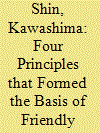| Srl | Item |
| 1 |
ID:
192569


|
|
|
|
|
| Summary/Abstract |
This essay is an examination of how Japanese perceptions of China have changed over time, paying particular attention to issues of political economy. It will examine relations both before and after the 1972 normalization of relations between the two countries.
|
|
|
|
|
|
|
|
|
|
|
|
|
|
|
|
| 2 |
ID:
172524


|
|
|
|
|
| Summary/Abstract |
This article examines Nakasone Yasuhiro’s policy toward China as a politician, including his remarks in the Diet before appointment as prime minister as well as exchanges with Chinese leaders during his prime ministership. Nakasone raised Japan-China relations to a level called a “honeymoon” in the 1980s, at which time the four principles of Japan-China relations were shared and there was the prospect of continued friendly relations into the 21st century. Behind the emergence of this era was not only Japan’s support for China’s economic development through ODA, but also the closeness of the stances that both Japan and China held toward the Cambodia and Korean Peninsula issues at the end of the Cold War. This may have been because there was the possibility for both parties to share information and mutually support each other. Nakasone actively talked not only with Hu Yaobang but also leaders such as Deng Xiaoping and Zhao Ziyang. However, as Nakasone’s partner Hu Yaobang was dismissed and the Cold War approached its end, the “honeymoon” between Japan and China came to an end, and the four principles by Nakasone and Hu gradually became just one frame of history.
|
|
|
|
|
|
|
|
|
|
|
|
|
|
|
|
| 3 |
ID:
183770


|
|
|
|
|
| Summary/Abstract |
In 2021, the Xi Jinping administration delivered a series of speeches concerning Chinese Communist Party (CCP) history. Xi himself showed interest in CCP’s history when he held office in coastal provinces, but during the Hu Jintao period, CCP administration started advancing an ideological history policy that strengthened the importance of socialist history. The “Ma Project” was founded as an organization to prompt ideological education. After the start of the Xi administration, the Ma Project became more active under Xi’s history policy. Xi’s administration places importance on the CCP’s and socialist history and adopted the policy of the “Four Histories.” The discourse of Xi’s speeches in 2021 that advocate the legitimacy of the CCP is based on the narratives of Four Histories. Xi’s administration is advancing a history policy that puts the Four Histories into the core curriculum of universities and penetrates society through propaganda and mobilization.
|
|
|
|
|
|
|
|
|
|
|
|
|
|
|
|
| 4 |
ID:
066990


|
|
|
| 5 |
ID:
065115


|
|
|
| 6 |
ID:
186962


|
|
|
|
|
| Summary/Abstract |
As the war in Ukraine becomes protracted, there is discourse comparing China and Russia as tyrannical states versus states based on the principles of democracy. However, while China appears to support Russia’s opposition to NATO’s eastward expansion, it abstained from voting on the resolution condemning Russia in the UN General Assembly, and, at the same time, China has shown consideration for Ukraine by saying that it values sovereignty and that Ukraine is no exception. China’s response seems by no means simple.
|
|
|
|
|
|
|
|
|
|
|
|
|
|
|
|